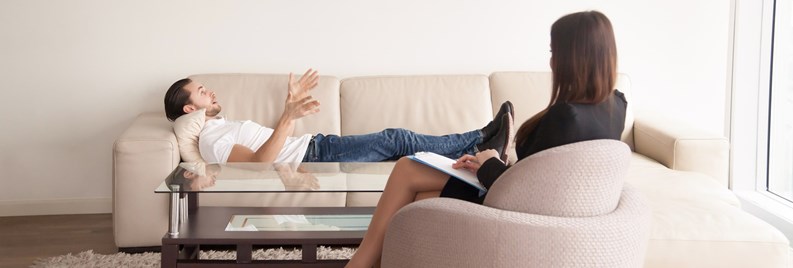What’s more ‘New York’ than therapy? How many Woody Allen movies feature a scene where Allen’s character is lying on a comfortable couch in an impeccably decorated room overlooking the Hudson as he confesses to his psychotherapist? That scenario is usually played up for laughs in the movies, but the truth about in-home therapy offices is quite different from fiction.
Can You Practice Where You Live?
The first main question is: Are in-home therapy offices legal? In a word, no. Stuart Halper, Vice President of Impact Real Estate Management, which has offices in Manhattan, Long Island and Westchester, says “There is a prohibition in the proprietary lease in the case of a co-op, and a similar prohibition in the condominium declaration in the case of a condominium.” These documents define what constitutes legal use of your apartment, and almost universally limit that use to residential purposes only. Seeing patients in your living room isn’t considered a residential use.
In addition to the proprietary lease or condominium declaration prohibitions against non-residential use of your unit, there is also the certificate of occupancy (COO) issued to residential buildings by the City of New York. In virtually all cases, the uses spelled out in the COO will match those outlined in the co-op or condo documents. For apartment properties, that use is strictly limited to residential activities. The exception to the rule is co-ops and condos that are legally designated as live-work spaces, such as artists' lofts or other similar units often found in older buildings that have been converted to residential use from manufacturing, office or other commercial uses.
So what happens if it comes to light that a resident is seeing patients or clients in his or her home? According to Halper, it depends on the co-op. “Sometimes boards look the other way,” he says. “In any event, it’s a violation of the lease. We’ve seen both situations. Some boards will take action, especially in Manhattan. You can be evicted easily under your proprietary lease.”
A Real-Life Experience
Therapist Dana Greco lives in a co-op in Riverdale where she has also served as a board member. Prior to her current digs, she resided at an Upper West Side co-op. “I did see some patients on a limited basis in my apartment when I lived on the Upper West Side,” she says. “I became a therapist when I lived there. I lived on the first floor, so it was easy. They rang the bell and I came out and let them in. My neighbors knew about it and no one ever complained. They were fine with it. I was also careful about who I saw at home, as I am a single woman and my kids lived with me then. The co-op never approached me about it, and I never initiated a discussion with them.”
But the situation is different at Greco's current Riverdale home. She now has three offices in New York City and Long Island and doesn’t see patients at home at all. “This subject came up during my tenure on the board, though not relative to me,” Greco says. “We discussed it, and the decision was made that no one could work out of their apartment for any reason.” She concurs with the decision. Additionally, Greco is a member of a professional therapists’ group and says that none of her peers in that group has a practice at home either.
In short, if you are a therapist--or for that matter an entrepreneur conducting a business of any kind in your apartment--it’s best to consult with your board. The rules are clearly against you, but depending on what you’re doing, the board may make an exception. That's far better than receiving a 'cease-and-desist' notice--or worse, an eviction action.
AJ Sidransky is a staff writer at The Cooperator and a published novelist.







Leave a Comment